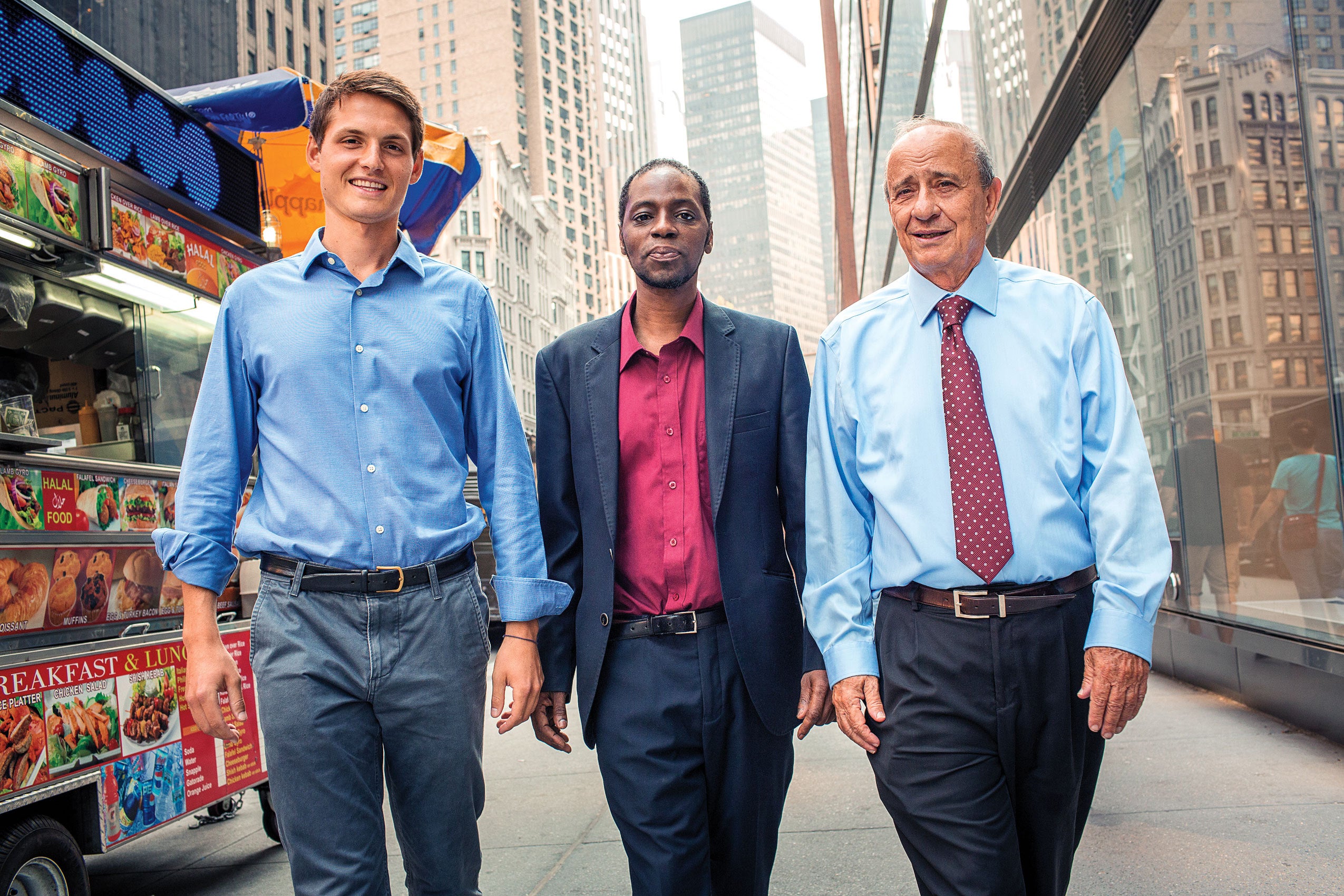Jonathan Hiles was 5 years old when Kareem Bellamy was arrested for murder. This past spring, Hiles helped Bellamy win a $2.75 million settlement from the state of New York for the 14 years he was wrongfully imprisoned.
Bellamy’s nightmare began when a young man named James Abbott was fatally stabbed in April 1994 in Far Rockaway, Queens, where he and Bellamy both lived. A few weeks later, a cashier from a local supermarket phoned the NYPD and reported that she saw, standing on the street where the murder had taken place, a man she claimed had been in the same checkout line as Abbott just before his murder. The man was Bellamy. He was promptly arrested.
Hiles, now a third-year student at HLS, describes footage of Bellamy’s trial—preserved by a Court TV show—as “heartbreaking.” The government’s case unraveled when its sole eyewitness (whom police had coaxed into identifying Bellamy from a live lineup at the station) failed to pick him out of a photo lineup—with Bellamy in the courtroom. But his lawyer didn’t capitalize on the government’s fecklessness, and the jury convicted. After hearing the verdict, Bellamy was so inconsolable that he had to be carried from the courtroom by four bailiffs, one on each limb.
The agony captured by Court TV, however, would help provide for Bellamy’s deliverance: Locked up at Shawangunk Correctional Facility upstate, he wrote to every lawyer he could find, imploring them to watch the debacle on tape. None responded, until a Manhattan attorney named Thomas Hoffman, having first thrown Bellamy’s letter in the trash, pulled it back out and began digging into the case.
“How could I not say, ‘I will look at it’?” says Hoffman, a Hungarian Holocaust survivor who was hidden from the Nazis by his father’s employees. “How could we be part of a system that doesn’t even look at it? I couldn’t keep it in the garbage can.”
The two would need help. “We were having money problems—because Tom was a ghetto poor lawyer,” Bellamy joked recently as the three rode together in Hoffman’s car to a lunch upstate. (Hoffman is actually a successful solo practitioner, but reversing a wrongful conviction generally requires years of costly investigation and litigation.) In an echo of Bellamy’s letter-writing campaign, Hoffman sent the Court TV tape to every major law firm he could find. None wrote back, until—nine years after Bellamy’s conviction—newly minted Cravath partner Darin McAtee ’91 took the tape home to watch with his wife.
“She said, ‘You have to take the case—that guy’s innocent,’” McAtee recalls. They were both struck by Bellamy’s reaction to the verdict: “You could just tell that he was so rattled by this—it’s not the reaction you would expect from somebody who had killed somebody.”
“We’ve become like a tightknit family,” says Hiles.
Soon McAtee was immersed in his first-ever criminal case, knocking on doors in blighted Far Rockaway and heading up to Shawangunk to meet his new client. Cravath would end up pouring around $5 million in pro bono hours and costs into the case. At its height, McAtee says, it was “the equivalent of a major case for any big corporate client,” with two Cravath partners—McAtee and his friend Antony Ryan ’95—as well as six associates and two private investigators working full time
After a winding journey—prolonged by Bellamy’s refusal to accept a plea that would have implied guilt, even in exchange for his freedom—the team won Bellamy a new trial in June 2008. He was released from prison that August, and all charges were formally dismissed in September 2011.
Hiles joined what he calls this “unlikely troop” in 2009, when he spent the summer before his senior year at Brown interning in Hoffman’s office. He was working on a separate case but got to know Bellamy a little; he describes him, during their first meeting, as “shy but then very warm,” with a sense of humor in spite of the “sword of Damocles” of “possibly having to return to prison for life” hanging over him. Hiles then kept in touch with Hoffman while teaching middle school English in Jackson, Mississippi, through Teach For America, during which time he accepted Hoffman’s invitation to start putting together a manuscript of the Bellamy saga. A year into HLS, he took a leave to work full time on the book, which he and Hoffman are now finalizing.
During that year, Hiles also began assisting with Bellamy’s civil claims: the state case, which settled in May for $2.75 million, and the federal case, which continues to go forward in front of Judge William F. Kuntz II ’77. For the state case, Hiles helped Hoffman prepare a comprehensive letter, presentation and binder boiling down the entirety of the case; for the federal case, he’d already logged well over 500 hours, culling nearly 30,000 pages of discovery, prepping for and attending depositions and hearings, working on various discovery motions—all while completing his 2L year.
Hiles is reluctant to put his own involvement front and center—insisting that he can’t begin to understand the toll of the work the way the lawyers who have been with Bellamy since 2004 can—but he speaks about Bellamy’s odyssey with encyclopedic knowledge. Anger comes through when he discusses the state’s attempts to “use Kareem’s fear of dying in prison to extort a face-saving plea for them,” and pride when he discusses his refusal to take the deal.

“We’ve become like a tightknit family,” Hiles says, noting the letters and meals that he, Bellamy, and Hoffman still share with the other lawyers and investigators who worked on the case. The bond is especially deep, he notes, between Hoffman and Bellamy: “Tom’s been the one person Kareem can count on in his life.”
The now-48-year-old Bellamy is quick to emphasize that if he could give up the money to change what happened to his 26-year-old self, he “would do it in a second.”
“I cry a lot because of my kids,” he says. When he was arrested, he had three children under the age of 10. “They were affected just as much as I was. In a way I think even more—because they didn’t deserve to be raised without a father.”
Though Bellamy now devotes his own time to helping others who have been wrongfully imprisoned, Hoffman stresses that the team’s work helping Bellamy is far from over. “They say lawyers shouldn’t get involved with their clients,” the 71-year-old laughs. “But I never really agreed with that.”
Hiles has adopted the same ethos: He describes Kareem as a “close friend” and knows his life inside out—from his case to his family to his health problems.
“As I told Jonathan and Kareem,” Hoffman adds, “if we’re unable to help Kareem transition back, then we’ve done nothing.” He pauses, shifting to address Kareem: “We’ve gotta help you get back on your feet.”
